Diary Chapters
Biodiversity
Wise Words
"The only way to save a rhinoceros is to save the environment in which it lives, because there’s a mutual dependency between it and millions of other species of both animals and plants."
- David Attenboro...
THINK GLOBAL, ACT LOCAL - Animals need
young people to find a solution!
Australia is a popular destination for tourists because of our
amazing mix of animals, plants and landscapes. Some of them can't
be found anywhere else in the world - like woylies - and we need to
protect them. Scientists have collected evidence that global
environmental issues can upset the balance of our Australian
ecosystems. What are these issues and how are they
threatening our environment? Read on to learn more and don't forget
to check out these cool games as you go to make
it fun!
WHAT'S COOKING - Variety is the spice of
life
A yummy dish includes all kinds of ingredients with just the right
amounts of everything. Biodiversity is like that - it's the balance
of a variety of animals, plants, micro-organisms and humans and the
way they work together to form an ecosystem. If things aren't in
balance, something needs to be done to restore that ecosystem to good health.
Check out this food web example of how a
complex ecological system functions!
Find out about environmental issues in your area. Get in touch
with a local environment group, such as Junior
Landcare, to see what you can do to help.
The blue whale is the largest animal on earth. Learn more about
whaling
and ask your family if you can go whale watching. It is a magical
experience.
There are over 13 million different species of plants, animals
and micro organisms on Earth. You can find out about them all
on the Catalogue of Life website and
see why biodiversity is so important here!
Clayton North Primary School,
VIC
The students have been leading my example being
involved in an incredible number of projects this year. The Student
Green Team has held Earth Hour, sold produce from their garden and
given tours to others to teach them about it. The new indigenous
garden has been a great success. Students from each year level have
run their own projects including the year 3/4s who ran a pedal
power disco!
Conduct a biodiversity study at your home or school. Make a list
of all the different plants and animals you can find, any kind of
plant of animal will do - black ant, golden orb spider, ring tail
possum anything! Research their scientific names and take
photos to help. You can keep this forever so t
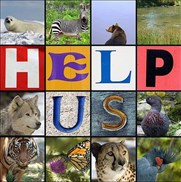 GOING, GOING,
GONE?
GOING, GOING,
GONE?
Poaching, diseases, land clearing and climate change are the main
threats to the survival of our animal species.
Governments around the world are taking action to protect
threatened species and their habitats from extinction (watch here to find out more). The
International Union for the Conservation of
Nature (IUCN) splits up species into different groups
depending on how risky their survival is using these
categories:
Extinct: all gone!
Extinct in the wild: some are in zoos - but
none are left in the wild,
so they are precious
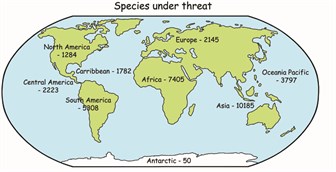
Critically endangered: there's a real chance
they will soon be gone in the wild - focus hard here!
Endangered: Could be a real chance on
extinction soon - be aware!
Vulnerable: Medium term risk of extinction - so
we need to protect them!
Near threatened: Could be at risk in future -
so keep them in mind!
Least concern: No worries mate - at least
compared to other species
Find out which species are threatened here.
SMALL ACTIONS, BIG CHANGE
Use the IUCN Red List of Threatened Species to find out about
threatened species. Here are some action ideas - can you think of
other ones?
- Recycle mobile phones to stop coltan (columbite-tantalite)
mining in gorilla habitats in the Democratic Republic of Congo
- Buy palm oil free products to protect orangutans in South East
Asia
- Use recycled paper or sustainable forestry products to stop
land clearing in the rainforests of South America and South East
Asia
- Buy sustainable seafood to stop overfishing
- Plant Australian trees and flowers in your garden
- Become an Earth Ranger by learning and
protecting animals online!
Stuff to Check Out
ONCE UPON A TIME THERE WAS A THYLACINE
The Thylacine, better known as Tasmanian Tiger,
was the largest carnivorous marsupial in our recent
history. After decades of hunting, diseases and
habitat destruction, the last Tassie Tiger, 'Benjamin',
died in 1936 in Hobart Zoo. The Thylacine is the
only marsupial to become extinct on the island of
Tasmania, in comparison to the huge number of
mammals who are now extinct from the Australian
mainland. It might be too late for some of our extinct
animals but we can help save the threatened ones.
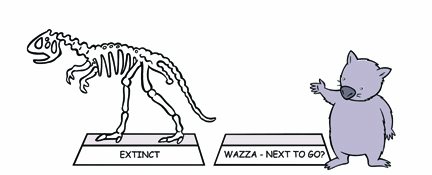
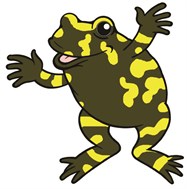
MISSION RECOVERY
Fabio the Southern Corroboree Frog and his friends are part of a
breeding program at the Amphibian Research Centre in Melbourne.
Fabio is an endemic species and depends on chilly ecosystems in the
Snowy Mountains and Brindabella Ranges to survive. At the research
centre, Fabio and his friends live in the fridge, in the hope that
they will make lots of babies and return home soon. Researchers are
also working in the field to learn about the best possible
environment for Fabio and his family. We need to give them a hand
to protect the alpine ecosystems of Australia! You can learn more
about them on the Zoo's Victoria website here!
What can you do to help?
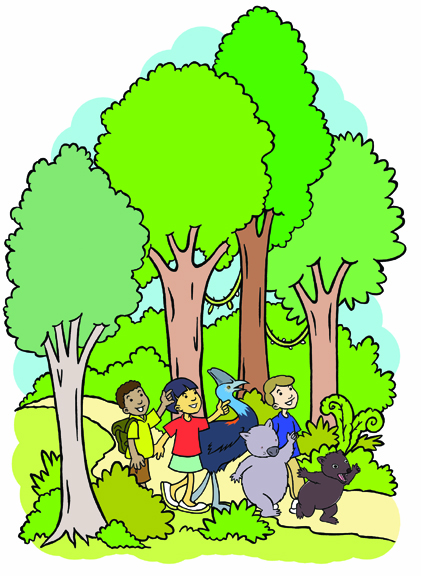
OUTDOOR PROJECTS
Sometimes we are so busy we don't stop and look around - outside
is amazing! Grab your hat and go.
- Make a bird bath
- Plant a butterfly garden with plants that flower at different
times of the year to have year round blooms
- Stop and listen. What can you hear outside?
- Take your family for a bush walk and spot some birds
- Collect rocks and find out about the different types
- Start a compost heap
Check out this great game and help Sam
learn about the impacts of farming on the environment and how to
solve them!

BE A DETECTIVE
The only way to find out what's going on in your backyard is to
get out there and have a close look. Plants and animals leave all
sorts of clues, so keep your eyes peeled!
- Watch out for scats - or animal poo! These
little 'presents' are sure-fire signs of the presence of animals
nearby. Take a photo, draw a sketch but you probably don't want to
touch or smell them!
- Look for tracks. Even animals without feet
leave footprints of some sort. For thousands of years, Australia's
Indigenous people used animal tracks to find food.
- Search for signs. Holes in a leaf could be
evidence that an insect lives nearby. Holes in the ground could be
evidence of an animal's home - a spider, snake or maybe even a
wombat.
If you can't find any animals at all, you can take a shortcut.
You can use the Gould Leagues Australian Wildlife Camera to
watch animals in the wild!